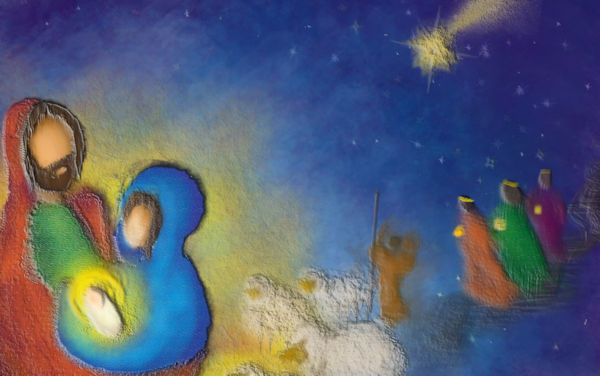“Epiphany is a loaded day on the Christian calendar,” says Yvette Moore, United Methodist Women.
YVETTE MOORE
United Methodist Women
Epiphany is a loaded day on the Christian calendar.
Epiphany is the 12th day after Christmas, January 6, which is also the day before the Orthodox Church’s Christmas Day, January 7. That means Epiphany is also Orthodox Christmas Eve. So how and what Epiphany celebrates depends on where you are in the Christian community.
And it’s a lot.
Read: Matthew 2:1-12; 3:13-17; John 2:1-11.
The word Epiphany comes from the Greek word epiphania, which means divine manifestation, and it references a visit of a god to earth.
In some Christian traditions, Epiphany celebrates the day Jesus is baptized: His divinity and role on earth are revealed as he comes up out of the water, the Holy Spirit descends on him and the Witness in Heaven says, “This is my beloved Son in whom I am well pleased.”
Other Christian traditions include Jesus’ miracle of turning water into wine at the wedding feast in Cana in Galilee in Epiphany celebrations of the revelation of Jesus as the Christ.
In The United Methodist Church and many other Western traditions, Epiphany marks the arrival of the Magi from the East who bring worship and gifts of devotion to the Christ Child, revealing his divinity.
Other traditions yet cite all of the above in their Epiphany celebrations of the Divine Visitation in the life of Jesus Christ.
Old Christmas
Growing up, my mother called Epiphany “Old Christmas,” a term that reflects the West’s switch from the Julian calendar to our current Gregorian one and explains why Orthodox Christmas is on January 7. In our family tradition, the day marked the end of the holidays, because when even Old Christmas was over, it was time to take down the Christmas tree. Other than that, we really didn’t pay much attention to Epiphany.
That is, until the local news started covering Three Kings Day.
In the mid-1970s the Hispanic community in my city had grown to the point that their traditions began to garner attention — especially since one of their traditions was celebrating Epiphany with a big parade through the streets of Spanish Harlem. The Magi were depicted as three enormous, colorfully painted, papier-mâché “king” puppets leading a procession that included a camel, lots of parents and children, toys for children in the neighborhood and huge papier-mâché gifts for the baby Jesus in a crèche scene stationed at a church on the route.
A sight like that made me think about the Magi. Who were they? How could a star constellation be so unusual as to move rich kings to leave the comforts of wealth and to cross deserts spanning East to West in search of the Christ Child? How did they know the special star signaled the birth of a Christ Child? What book of prophesy was that written in? They weren’t looking at the Hebrew scriptures, because why would they then have had to stop to inquire of King Herod, who called in the Jewish priests and scholars? What was the religion of Magi anyway? They weren’t Jews, so how is it that God was talking to them through their religion, which apparently included astrology, which I’d been taught was not Christian?
Epiphany Lessons
Nearly 30 years later, I still have no substantial answers to these questions about the Magi. But Epiphany continues to reveal to me important lessons about following Jesus the Christ on a shrinking earth and in a nation that’s increasingly diverse.
Here are a few Epiphany lesson for me, found in Scripture and from my neighborhood:
- Jesus the Christ can be revealed in different ways, places, times and cultures.
- Unexpected strangers can bring unexpected, but needed, treasures.
- With God, acts of love and kindness trump theology and protocol.
- God spoke to the Magi over 2,000 years ago, and after 30 years of asking, I still don’t know who they were or why God was talking to them. There’s no reason to believe God’s not doing things like this in my neighborhood, our nation and in the world today.
Last Updated on January 4, 2018

